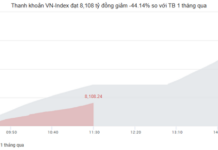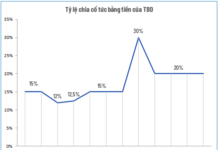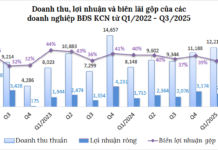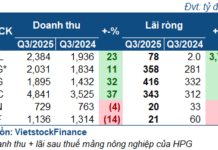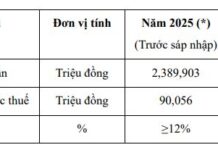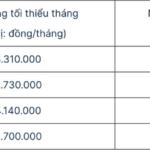The Prime Minister chaired an online meeting on digital transformation from the Government Headquarters to the People’s Committees of provinces and centrally-run cities.
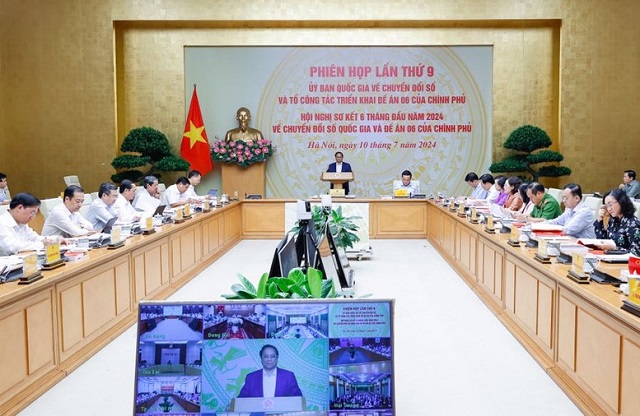
The Prime Minister affirmed that digital transformation has become a trend and strategic choice – Photo: VGP/Nhat Bac
|
Digital product exports in the first six months are estimated at 64.8 billion USD.
Reports and opinions at the meeting evaluated that the National Digital Transformation and the implementation of the Government’s Project 06 have achieved six outstanding results in the first half of the year.
Firstly, the leadership, direction, administration, and implementation have been carried out drastically and synchronously with high determination from the central to local levels.
In the first six months of the year, the Prime Minister issued five decisions, three directives, and three telegrams, while ministries and sectors have also issued guiding documents within their competence to promote digital transformation and the implementation of Project 06.
Agencies have completed 19 out of 79 tasks in the 2024 action plan of the National Committee on Digital Transformation.
43 out of 229 tasks for 2024 of Project 06 were completed (after 2.5 years of implementing Project 06, a large volume of work has been done with 244 completed tasks).
55 out of 63 localities have issued plans to promote the implementation of Project 06 in 2024.
Secondly, the improvement of institutions, mechanisms, and policies to create a legal framework and favorable conditions for the National Digital Transformation and Project 06 has been actively implemented.
In the first six months, the Government issued eight decrees, while ministries and sectors issued 10 circulars within their competence. So far, 828 out of 1,084 administrative procedures assigned in the Government’s specialized resolutions have been simplified, including 242 procedures in the first six months. All 63 localities have issued resolutions to exempt and reduce fees and charges for people and businesses in carrying out administrative procedures.
Thirdly, the digital economy and digital society have continued to develop strongly in many fields.
The information and communications technology (ICT) industry has developed quite well (according to the report of the Ministry of Information and Communications, revenue in the first six months is estimated at over 1.9 million billion VND, up 26% over the same period).
Digital products of Vietnamese enterprises have continued to develop and been exported worldwide. According to the General Department of Customs, digital product exports in the first six months are estimated at 64.8 billion USD, up 23%, and imports reached 56.1 billion USD, up 27.2%.
Many leading global technology corporations have committed to investing and expanding investment in Vietnam, especially in new fields such as electronics, semiconductor chips, research and development, and artificial intelligence.
E-commerce and cashless payments have been actively deployed (according to the State Bank, non-cash payment transactions increased by 58.2% in volume and 36.7% in value).
The health sector is actively deploying electronic medical records; more than one million policy beneficiaries receive social security allowances, and 1.8 million people receive pensions and social insurance benefits through their accounts.
The expansion of the tax base, tax administration, and electronic invoices have been drastically and strongly implemented with positive changes; tax revenue from e-commerce activities has increased year by year (83 trillion VND in 2022; 97 trillion VND in 2023; and over 50 trillion VND in the first six months of 2024).
Fourthly, digital infrastructure and platforms have been invested in and developed. Many large and modern data centers have been inaugurated and put into operation. The National Data Center is being actively implemented.
100% of communes, wards, and towns have broadband Internet access, and 100% of agencies from the central to communal levels have been connected to the specialized data network (in the first six months, 256 signal and power-deficient points were eliminated).
Fifthly, the development of national and specialized databases has been promoted, and data connection, integration, and sharing have made progress.
The National Population Database has connected, shared, authenticated, and cleaned data with 85 ministries, sectors, localities, corporations, and State-owned enterprises (100% of citizens have been assigned personal identification codes; 86.3 million citizens have been granted electronic chip-attached identity cards; and more than 75.7 million VNeID accounts have been granted).
Many digital utilities for people and businesses have been actively piloted and deployed, such as the issuance of criminal record certificates on VNeID (piloted in Hanoi and Thua Thien-Hue)…
Sixthly, the provision of online public services for people and businesses has been promoted.
So far, there have been 16.4 million accounts and 51.6 million dossiers submitted on the National Public Service Portal (in the first six months, 4.8 million new accounts were granted and 13.9 million dossiers were submitted).
43 out of 53 essential public services have been deployed (an increase of five services compared to the end of 2023). Especially, the 25 essential public services of Project 06 alone save the State and society 3,500 billion VND per year.
The digitization rate of dossiers and results of administrative procedure handling has been promoted (46.4% for ministries, an increase of 22.1%; and 58.1% for localities, an increase of 14.6%). From July 1, 2024, people can use a single VNeID account to perform online public services.
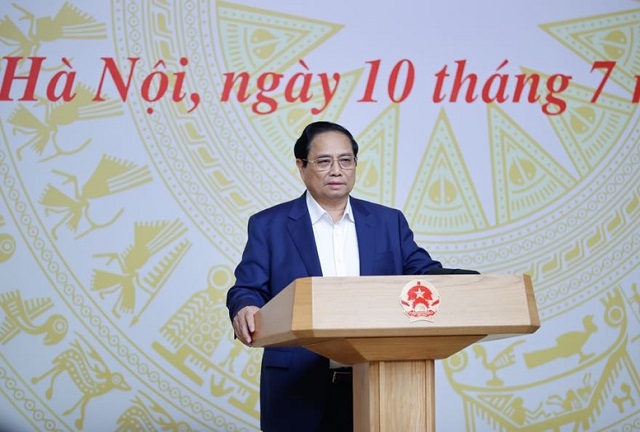
The Prime Minister summarized some lessons in digital transformation, the first of which is that the head of each agency must take the lead – Photo: VGP/Nhat Bac
|
Digital transformation has reached “every alley, every house, and every person”
Concluding the meeting, Prime Minister Pham Minh Chinh basically agreed with the contents of the reports, discussions, and frank and constructive opinions of the delegates. He assigned the Ministry of Public Security, the Ministry of Information and Communications, and the Government Office to absorb the opinions and complete and submit a directive document of the Prime Minister and Chairman of the National Committee on Digital Transformation for unified implementation in the coming time.
Regarding the results achieved, the Prime Minister affirmed that digital transformation has become a trend and strategic choice. The leadership and administration have become more experienced, well-organized, and practical and effective. The implementation has been synchronously and actively deployed by all levels. The results have been practical and positive.
“People and businesses have supported, accompanied, and actively participated. Digital transformation has reached every alley, every house, and every person. The trust of all levels, sectors, and people and businesses has been consolidated and raised, contributing to inspiring and creating new momentum for development,” said the Prime Minister.
On behalf of the Government, the Prime Minister acknowledged, praised, and highly appreciated the efforts, dedication, and results achieved by ministries, sectors, and localities; the resolute direction of the members of the National Committee on Digital Transformation and the Project 06 Working Group; and the unanimity, support, and active participation of the people and businesses.
Besides the very important achievements, the Prime Minister pointed out that the National Digital Transformation and the implementation of Project 06 still have limitations and shortcomings, and there are tasks that are behind schedule.
Specifically, the development and improvement of the legal environment, mechanisms, and policies are still inadequate and untimely. Many tasks according to the plan of the National Committee on Digital Transformation and Project 06 have not been completed as scheduled. The Prime Minister criticized ministries, sectors, and localities that have not built plans for the Steering Committee on Digital Transformation.
The development of the digital economy is still not commensurate with its potential, and investment remains scattered. The development of digital infrastructure, platforms, and data is still fragmented, with information silos and data fragmentation (the digital infrastructure and platforms of many agencies are invested in a lack of synchronization and do not ensure connectivity and information sharing). There are still many villages without optical fiber cables and 821 mobile signal-deficient points.
Network security and information safety in many places have not been paid due attention. The reduction and simplification of administrative procedures remain slow. The quality of online public services is not high. Human resources for digital transformation and Project 06 are still insufficient in quantity and quality and unevenly distributed, especially high-quality human resources and human resources in emerging industries.
The Prime Minister summarized some lessons in digital transformation, the first of which is that the head of each agency must take the lead; have high determination, great efforts, and drastic actions; work with a focus on priorities, avoid scattering, and do one thing at a time; clearly assign tasks to individuals with clear priorities, focus, timelines, and results for easy checking, monitoring, and evaluation; and inspect, monitor, urge, and reward or discipline in a clear and timely manner.
It is necessary to mobilize the whole political system and take synchronous action at all levels and sectors and with the active response and participation of the people and business community. There must be specific programs and plans that listen to the breath of life, closely follow practical situations, and respond flexibly, timely, and effectively.
It is essential to promote the development and improvement of institutions, mechanisms, and policies and boldly pilot new models to meet practical requirements and development trends. All resources must be mobilized and used effectively, and the public-private partnership model must be promoted, with public investment leading and stimulating private investment.
It is necessary to always maintain discipline and promote decentralization and delegation of power associated with the allocation of resources, improve implementation capacity, and strengthen inspection and supervision; resolutely fight corruption, negativity, and group interests; and promote policy communication to create social consensus and strengthen people’s trust.
People and businesses must be placed at the center as the subject and target of digital transformation; always be receptive to their feedback; and speak and act truthfully so that people and businesses can truly benefit from the results of digital transformation in the spirit of “leaving no one behind.”
The head of each agency must directly lead and prioritize resources for digital transformation
The Prime Minister identified key tasks and solutions for the coming time. The first task is to continue raising awareness among all levels, sectors, and people and businesses about the position, role, importance, influence, and spillover effects of digital transformation and its role as a driving force for development and growth; and focus on building and sharing databases of ministries, sectors, and localities and connecting them with the national database.
The Prime Minister requested that ministers, heads of sectors, and chairpersons of the People’s Committees of provinces and centrally-run cities directly lead this task, prioritize resources, and synchronously deploy tasks and solutions for digital transformation with a spirit of only discussing how to do it, not whether to do it or not, and once committed, it must be done, and once done, there must be concrete products and results.
By 2025, it is necessary to strive for 100% of online public services, 50% of the adult population using online public services, 100% of dossiers in handling administrative procedures with personal identification, 90% of people and businesses satisfied with the handling of administrative procedures, and a reduction of 50% of procedures and papers of people related to the population database…
It is necessary to urgently handle overdue and outstanding tasks in the 2023-2024 period. 12 ministries, sectors, and 20 localities that have not yet issued plans must urgently issue digital transformation plans for 2024 before July 20, 2024.
The Prime Minister assigned the Ministry of Information and Communications to organize a meeting to unify the contents with relevant ministries and sectors, urgently complete and submit to the Prime Minister for issuance of the “Strategy for the Development of Vietnam’s Semiconductor Industry by 2030” in July 2024.
The Ministry of Planning and Investment was assigned to urgently complete and submit to the Prime Minister for issuance of the Scheme on “Human Resource Development for the Semiconductor Industry by 2030, with a vision to 2045” in July 2024. The General Statistics Office, under the Ministry of Planning and Investment, announces the data on the proportion of the digital economy in GDP annually as prescribed.
Regarding the development and improvement of institutions, mechanisms, and policies, the Prime Minister assigned the Ministry of Information and Communications to urgently build and complete the submission to the Government for the issuance of documents guiding the Law on Electronic Transactions and the Law on Telecommunications. It is also necessary to soon research and build and issue national digital address standards.
The Ministry of Finance was assigned to soon submit to the Government for issuance of a decree regulating the formulation of estimates, management, and use of regular state budget expenditures to implement investment projects in the construction, renovation, and upgrading of projects that have been invested in; the purchase of assets, repair, and upgrade of machinery and equipment.
The Ministry of Home Affairs was assigned to urgently build and complete the submission to the Government for the issuance of documents guiding the Law on Archives (amended).
Regarding the development of the digital economy, the Prime Minister requested that ministries and sectors urgently organize specialized meetings on the digitization of the industries and fields they manage. It is necessary to promote the digitization and enrichment of databases of ministries, sectors, and localities and build and put into operation a database for sharing in e-commerce.
It is necessary to promote digital transformation in tax administration and synchronously deploy solutions for electronic invoices, especially electronic invoices in direct retail sales; develop e-payment infrastructure and credit information infrastructure to ensure continuous, smooth, safe, and efficient operation to meet diverse and rapidly increasing payment needs.
Regarding online public services, it is necessary to soon complete the deployment of the remaining 30 essential public services (especially the integration and publication of the group of administrative procedures for business registration and tax registration on the National Public Service Portal; and the connection and data sharing between the database of people with meritorious services, social protection, and poor and near-poor households with the provincial-level administrative procedure handling information system).
Regarding the development of the national digital infrastructure, the Prime Minister assigned the Ministry of Public Security to advise and submit to the Prime Minister for issuance of a directive to promote the implementation of Resolution 175/NQ-CP to speed up the progress of the construction of the National Data Center.
The Ministry of Health was assigned to soon complete and submit to the Prime Minister for approval of the Scheme on the Development of Digital Infrastructure and the Application of Information Technology to Serve Health Digital Transformation by 2030.
Regarding the development of digital platforms, services, and data, the Prime Minister assigned the Ministry of Construction to quickly connect and share data between the Housing and Real Estate Information System and the National Population Database, completing it in July 2024.
The Ministry of Agriculture and Rural Development was assigned to connect with the National Population Database for data sharing in fishing vessel registration and fishing logbooks; integrate VNeID accounts; and perform procedures for fishing vessel registration and fishing exploitation, completing them in September 2024.
The Ministry of Justice was assigned to connect and share data with the National Population Database and the sector’s databases such as electronic household registration, nationality, and criminal records, completing them in July 2024.
The Ministry of Labor, Invalids, and Social Affairs was assigned to take the lead, in coordination with relevant ministries and sectors, to issue a plan to collect DNA samples from the relatives of martyrs whose identities have not yet been determined, and officially announce the implementation on July 27, 2024 – the War Invalids and Martyrs’ Day.
Regarding network security and information safety, in the context of the increasing number of cyberattacks globally and in Vietnam, the Prime Minister requested that the Ministry of Public Security take the lead, in coordination with the Ministry of National Defense and the Ministry of Information and Communications, to hold monthly meetings to evaluate, guide, monitor, and protect the national information system and databases of ministries, sectors, and localities.
Regarding emulation and rewards, the Ministry of Public Security, the Ministry of Information and Communications, and the Ministry of Home Affairs were assigned to summarize and propose competent authorities to reward collectives and individuals and, at the same time, organize rewards within their competence.
Deposit Interest Rate Reaches 40.1% by 2023, MB Holds Top Spot in CASA for 2nd Consecutive Year
Thanks to our pioneering efforts in digital banking, 2023 marks the third consecutive year that MB has attracted over 6 million new customers annually, bringing the total number of customers served to 27 million.





